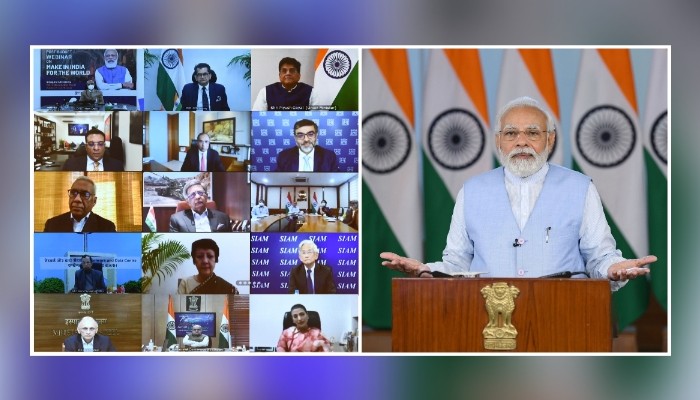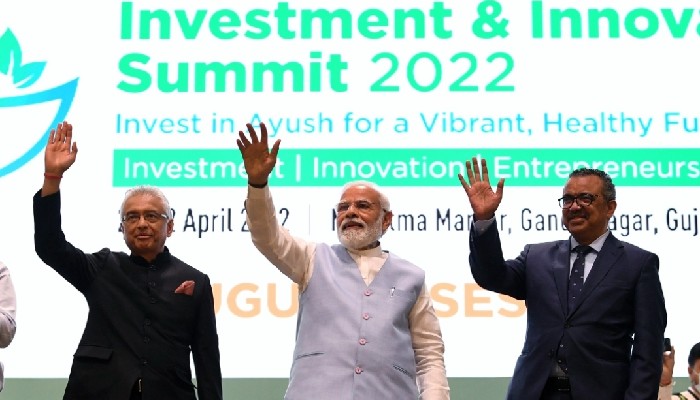During the COP26 Summit in Glasgow last year, Prime Minister Modi had said India will achieve net-zero emissions by 2070
lndia needs to focus on a hydrogen ecosystem in which the private sector can play a pivotal role, Prime Minister Narendra Modi said on Friday. Noting that India had set a target of extracting 50% of its energy from non-fossil fuels, PM Modi said, “It is our opportunity to shift to more sustainable practices”.
Addressing a webinar on ‘Energy for Sustainable Growth', the Prime Minister said, "India's vision is clear that sustainable growth is possible from sustainable energy sources only".
PM Modi said that the Hydrogen ecosystem was interconnected with fertilizers, refineries, and the transport sector and the private sector must innovate in it to fully utilize India's potential. He said Union Budget 2022-23 has drawn a special focus on Battery Swapping Policy that can scale the energy efficiency capabilities.
The Prime Minister said we must develop sustainable and innovative business models to improve efficiency in the Electric Vehicles EV ecosystem. He said the Government has scaled up the production of LED bulbs that immensely resulted in price-drop of an LED bulb and under the UJALA scheme the common man has also been able to save over Rs 20,000 crore in electricity bills of poor and middle-class families.
PM Modi informed that four pilot projects for coal gasification and conversion of coal into chemicals required for the industry will be set up to evolve technical and financial viability. He said every household should develop its own solar tree that can contribute to saving up to 15% of the electricity of that house. He added that it will not only be unique but will be environment-friendly.
During the COP26 Summit in Glasgow last year, Prime Minister Modi had said India will achieve net-zero emissions by 2070. India, which is home to 17% of the world's population, accounts for only about 5% of total (greenhouse gas) emissions, PM Modi had said in Glasgow.
Besides the net-zero target, PM Modi had also raised India’s Nationally Determined Contributions (NDCs) of achieving 450-gigawatt non-fossil energy capacity to 500 gigawatts by 2030. He also asserted that India is the only country that is delivering in "letter and spirit" the commitments on tackling climate change under the Paris Agreement.
"The world today admits that lifestyle has a major role in climate change. I propose a one-word movement before all of you. This word is LIFE, which means Lifestyle for Environment. Today, it is needed that all of us come together and take forward LIFE as a movement," the PM said.
The Prime Minister said energy-saving and production are equally important for sustainability. In this regard, there is a need to do a lot more to build more energy-efficient ACs, heaters, geysers, and similar appliances in India. He said the intent of the webinar is to focus on the implementation of the new budget schemes and to chalk out ways through which we can begin the execution that is effective and concrete.
Friday’s webinar was organized by the Sectoral Group on Resources comprising Ministries of Power; Petroleum and Natural Gas; New and Renewable Energy, Coal, Mines, External Affairs, and Environment, Forest and Climate Change.
The webinar was aimed at discussing the initiatives of the Government of India in the energy and resources sector which have been announced in Budget 2022 and to elicit ideas and suggestions for effective implementation of these initiatives.
According to the central government, the Budget 2022 underpins India’s energy transition journey by promoting a low-carbon development strategy, in line with the Panchamrit strategy presented by the Prime Minister at COP 26. This strategy will enable India to meet its energy requirements in a sustainable manner.
The webinar included sessions on different themes of relevance and witnessed participation from government officials of various ministries and state governments, industry representatives, and other experts.
The webinar was part of a series being organized by the central government across various key sectors to facilitate efficient and speedy implementation of Union Budget 2022 announcements.
 Contact Us
Contact Us  Subscribe Us
Subscribe Us









 Contact Us
Contact Us
 Subscribe
Subscribe
 News Letter
News Letter

